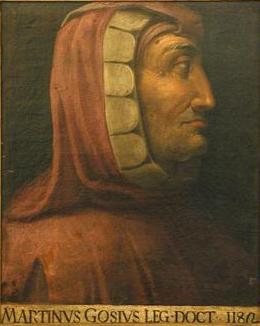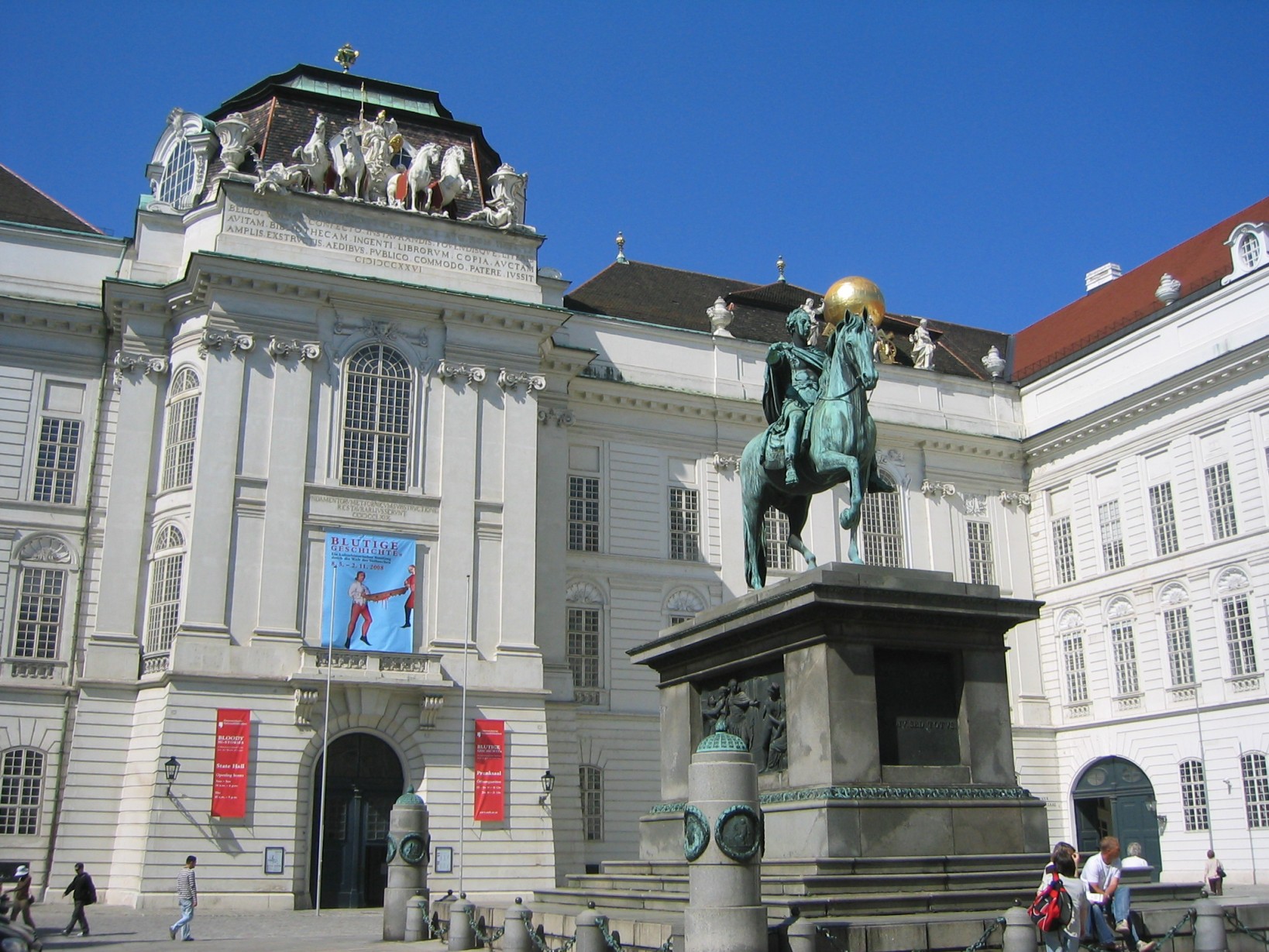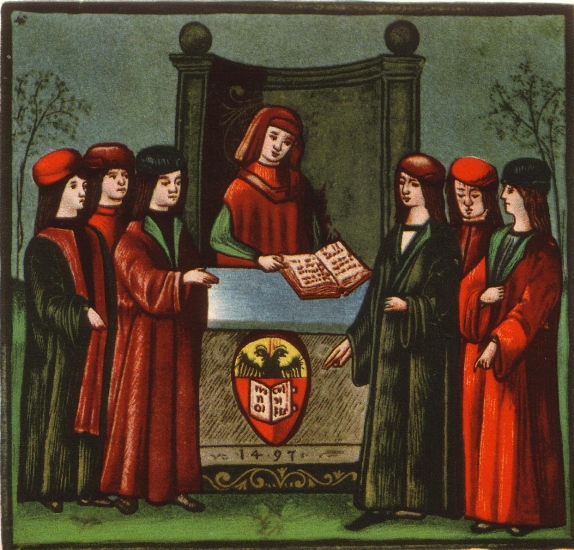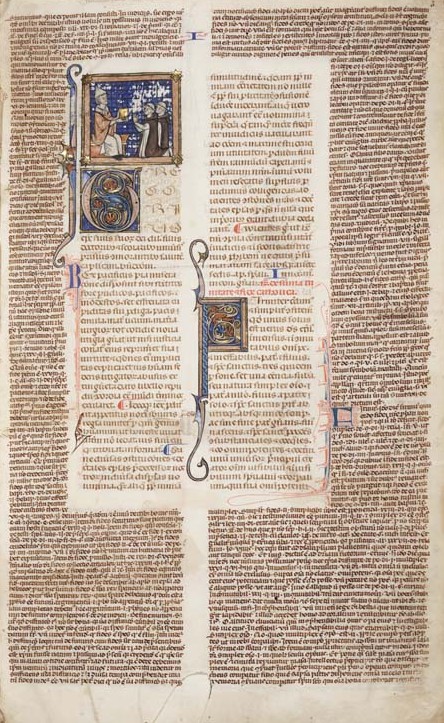|
Martinus Gosia
Martinus Gosia was one of the glossators and a 12th-century Italian jurist, counted among the Four Doctors of Bologna, the others being Bulgarus, Hugo de Porta Ravennate and Jacobus de Boragine. Martinus Gosia and Bulgarus were the chiefs of two opposite schools at the University of Bologna, corresponding in many respects to the Proculians and Sabinians of the Roman Empire. Martinus was at the head of a school which accommodated the law to what his opponents styled the equity of the purse (''aequitas bursalis''), whilst Bulgarus adhered more closely to the letter of the law. The school of Bulgarus ultimately prevailed. While the teaching of Bulgarus, became dominant in Bologna, among the ''nostri doctores'', the followers of Martinus, taught in southern France where they became known as the commentators. File:Martinus Gosia – Distinctio de interesse, 12th-century – BEIC 7375381.jpg, ''Distinctio de interesse'', 12th-century manuscript. Wien, Österreichische Nationalbiblio ... [...More Info...] [...Related Items...] OR: [Wikipedia] [Google] [Baidu] |
Martino Gosia
Martino may refer to: Places * Martino, Kardzhali Province, in Kardzhali Municipality, Bulgaria * Martino, Phthiotis, a village in central Greece People * Martino (given name) *Martin of Tours (316–397), one of a dozen saints bearing the name Martino in Italian *Martino da Como, 15th-century culinary maestro (born ca. 1430) *Pope Martin V (c. 1368–1431) *Al Martino (1927–2009), American singer *Bruno Martino (1925–2000), Italian composer, singer, and pianist *Donald Martino (1931–2005), American composer *Freddie Martino (born 1991), American football player *Gerardo Martino (born 1962), Argentine football manager * Kyle Martino (1981–), American footballer *Luciano Martino (1933–2013), Italian film producer, director and screenwriter *Miranda Martino (1933–), Italian singer and actress *Pat Martino (1944–2021), American jazz guitarist *Renato Martino (1932–), Italian Cardinal *Rinaldo Martino (1921–2000), Italian footballer *Rocco Martino, (born 1938), Ita ... [...More Info...] [...Related Items...] OR: [Wikipedia] [Google] [Baidu] |
Italian Roman Catholics
Italian(s) may refer to: * Anything of, from, or related to the people of Italy over the centuries ** Italians, an ethnic group or simply a citizen of the Italian Republic or Italian Kingdom ** Italian language, a Romance language *** Regional Italian, regional variants of the Italian language ** Languages of Italy, languages and dialects spoken in Italy ** Italian culture, cultural features of Italy ** Italian cuisine, traditional foods ** Folklore of Italy, the folklore and urban legends of Italy ** Mythology of Italy, traditional religion and beliefs Other uses * Italian dressing, a vinaigrette-type salad dressing or marinade * Italian or Italian-A, alternative names for the Ping-Pong virus, an extinct computer virus See also * * * Italia (other) * Italic (other) Italic may refer to: * Anything of or relating to Italy ** Anything of, or relating to, the Italian Peninsula *** Italic peoples, Italic-language speaking people of ancient Italy *** Italic la ... [...More Info...] [...Related Items...] OR: [Wikipedia] [Google] [Baidu] |
Österreichische Nationalbibliothek
The Austrian National Library (german: Österreichische Nationalbibliothek) is the largest library in Austria, with more than 12 million items in its various collections. The library is located in the Neue Burg Wing of the Hofburg in center of Vienna. Since 2005, some of the collections have been relocated within the Baroque structure of the Palais Mollard-Clary. Founded by the Habsburgs, the library was originally called the Imperial Court Library (german: Kaiserliche Hofbibliothek); the change to the current name occurred in 1920, following the end of the Habsburg Monarchy and the proclamation of the Austrian Republic. The library complex includes four museums, as well as multiple special collections and archives. Middle Ages The institution has its origin in the imperial library of the Middle Ages. During the Medieval period, the Austrian Duke Albert III (1349–1395) moved the books of the Viennese vaults into a library. Albert also arranged for important works from Latin ... [...More Info...] [...Related Items...] OR: [Wikipedia] [Google] [Baidu] |
Postglossator
The postglossators or commentators formed a European legal school which arose in Italy and France in the fourteenth century. They form the highest point of development of medieval Roman law. The school of the '' glossators'' in Bologna lost its vitality, resulting in the rise of a new school of legal thought in the 14th century, centred on Orléans in France. Bartolus and Baldus were the most famous of the commentators. Rather than simply seeking to explain the law, the commentators were more concerned with the potential for practical application of the law. Politically at this time, the idea of the Spirit of One – one church and one empire, was popular in Europe. Roman law thus appealed as bringing the potential for one law in addition. Roman law was written and certain as well as being generally consistent and complete. The educated liked its roots and saw the potential for application. The commentators faced head on the conflict of law with custom as they saw the potential f ... [...More Info...] [...Related Items...] OR: [Wikipedia] [Google] [Baidu] |
France
France (), officially the French Republic ( ), is a country primarily located in Western Europe. It also comprises of Overseas France, overseas regions and territories in the Americas and the Atlantic Ocean, Atlantic, Pacific Ocean, Pacific and Indian Oceans. Its Metropolitan France, metropolitan area extends from the Rhine to the Atlantic Ocean and from the Mediterranean Sea to the English Channel and the North Sea; overseas territories include French Guiana in South America, Saint Pierre and Miquelon in the North Atlantic, the French West Indies, and many islands in Oceania and the Indian Ocean. Due to its several coastal territories, France has the largest exclusive economic zone in the world. France borders Belgium, Luxembourg, Germany, Switzerland, Monaco, Italy, Andorra, and Spain in continental Europe, as well as the Kingdom of the Netherlands, Netherlands, Suriname, and Brazil in the Americas via its overseas territories in French Guiana and Saint Martin (island), ... [...More Info...] [...Related Items...] OR: [Wikipedia] [Google] [Baidu] |
Roman Empire
The Roman Empire ( la, Imperium Romanum ; grc-gre, Βασιλεία τῶν Ῥωμαίων, Basileía tôn Rhōmaíōn) was the post-Republican period of ancient Rome. As a polity, it included large territorial holdings around the Mediterranean Sea in Europe, North Africa, and Western Asia, and was ruled by emperors. From the accession of Caesar Augustus as the first Roman emperor to the military anarchy of the 3rd century, it was a Principate with Italia as the metropole of its provinces and the city of Rome as its sole capital. The Empire was later ruled by multiple emperors who shared control over the Western Roman Empire and the Eastern Roman Empire. The city of Rome remained the nominal capital of both parts until AD 476 when the imperial insignia were sent to Constantinople following the capture of the Western capital of Ravenna by the Germanic barbarians. The adoption of Christianity as the state church of the Roman Empire in AD 380 and the fall of the Western ... [...More Info...] [...Related Items...] OR: [Wikipedia] [Google] [Baidu] |
Sabinians
The Sabinian school was one of the two important schools of Law in Rome during the 1st and 2nd centuries CE. The Sabinians took their name from Masurius Sabinus but later were known as ''Cassians'' after Sabinus' student, Cassius Longinus. Sabinian views were based on the teachings of Gaius Ateius Capito, Sabinus' instructor and an adherent of conservatism in the reign of Augustus (27 BCE–14 CE). Among the few characteristics discernible in the attitude of the Sabinians was a legal conservatism reflecting their founder. In opposition to the Sabinians was the Proculeian school. A rivalry between the schools lasted well into the 2nd century, when they were united. The most famous head of the Sabinians was Salvius Julianus who succeeded Javolenus Priscus as head of the school.Tony Honoré Anthony Maurice Honoré, (30 March 1921 – 26 February 2019) was a British lawyer and jurist, known for his work on ownership, causation and Roman law.John Gardne''Tony Honoré as Teacher ... [...More Info...] [...Related Items...] OR: [Wikipedia] [Google] [Baidu] |
University Of Bologna
The University of Bologna ( it, Alma Mater Studiorum – Università di Bologna, UNIBO) is a public research university in Bologna, Italy. Founded in 1088 by an organised guild of students (''studiorum''), it is the oldest university in continuous operation in the world, and the first degree-awarding institution of higher learning. At its foundation, the word ''universitas'' was first coined.Hunt Janin: "The university in medieval life, 1179–1499", McFarland, 2008, , p. 55f.de Ridder-Symoens, Hilde''A History of the University in Europe: Volume 1, Universities in the Middle Ages'' Cambridge University Press, 1992, , pp. 47–55 With over 90,000 students, it is the second largest university in Italy after La Sapienza in Rome. It was the first place of study to use the term ''universitas'' for the corporations of students and masters, which came to define the institution (especially its law school) located in Bologna. The university's emblem carries the motto, ''Alma Mater Studio ... [...More Info...] [...Related Items...] OR: [Wikipedia] [Google] [Baidu] |
Glossators
The scholars of the 11th- and 12th-century legal schools in Italy, France and Germany are identified as glossators in a specific sense. They studied Roman law based on the '' Digesta'', the ''Codex'' of Justinian, the ''Authenticum'' (an abridged Latin translation of selected constitutions of Justinian, promulgated in Greek after the enactment of the ''Codex'' and therefore called ''Novellae''), and his law manual, the '' Institutiones Iustiniani'', compiled together in the ''Corpus Iuris Civilis''. (This title is itself only a sixteenth-century printers' invention.) Their work transformed the inherited ancient texts into a living tradition of medieval Roman law. The glossators conducted detailed text studies that resulted in collections of explanations. For their work they used a method of study unknown to the Romans themselves, insisting that contradictions in the legal material were only apparent. They tried to harmonize the sources in the conviction that for every legal questio ... [...More Info...] [...Related Items...] OR: [Wikipedia] [Google] [Baidu] |
Jacobus De Boragine
Jacobus de Boragine was one of the Glossators, and Four Doctors of Bologna. Also known as Jacobus, he was born in the early 12th century and was an Italian lawyer, one of four students of Irnerius called the ''Quattuor Doctores'', although Savigny disputes the general tradition of his inclusion in this list. The other doctors were Bulgarus, Martinus and Hugo. The legal philosophy of Bulgarus adhered closely to the letter of the law while their fellow, Martinus, took a more natural law and Equity approach. His time at Bologna was therefore one of the formative times in legal theory. He was an author of many parts of the Gloss of the ''Corpus juris civilis The ''Corpus Juris'' (or ''Iuris'') ''Civilis'' ("Body of Civil Law") is the modern name for a collection of fundamental works in jurisprudence, issued from 529 to 534 by order of Justinian I, Byzantine Emperor. It is also sometimes referred ...''. *The legal commentary ''De Regulis Juris'', which Savigny called "a ... [...More Info...] [...Related Items...] OR: [Wikipedia] [Google] [Baidu] |
Hugo De Porta Ravennate
Hugo de Porta Ravennate was an Italian jurist, and member of the Glossators of Bologna. He came from a noble family who had residence in the city of Bologna, but whose family name meant "the gate of Ravenna". Study and teaching at the University of Bologna, Hugo was one of the "four doctors", a group of disciples of Irnerius who were formative in the development of European law. Their authority was such that the four lawyers were called by Frederick Barbarossa as directors imperial in the diet of Roncaglia in 1158. This royal patronage allowed them to secure privileges for the newly developing institution of the university, at Bologna. It is not known when he died but it was after 1166 AD, when a document is attested to him, but no later than 1171 AD, when a document mentions his widow. He wrote the glosses to the recovered Roman law, the ''distinctiones'' and ''Summula de pugna''.Albrecht Classen,Handbook of Medieval Culture, Volume 3 (Walter de Gruyter GmbH & Co KG, 201 pag ... [...More Info...] [...Related Items...] OR: [Wikipedia] [Google] [Baidu] |




